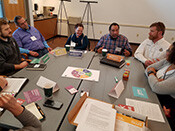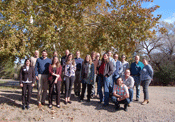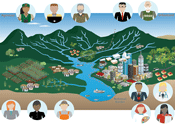Learn how to make an ecosystem health report card
Are you interested in learning the complete report card process to leverage real environmental change in your area? Join IAN's online science communication course and get familiar with all the steps from stakeholder mapping & engagement and conceptualizing ecosystem function to selecting indicators and benchmarks, analyzing data, and communicating results. Sign up or learn more here.Kicking off a report card for the Blue River in Kansas City, Missouri

At the end of November, IAN staff traveled to Kansas City, Missouri to initiate a report card for the Blue River with the Heartland Conservation Alliance, a non-profit working to conserve, protect, and restore natural lands and open space in the Kansas City region. A two-day workshop was held at the Anita B Gorman Conservation Discovery Center on November 27 and 28, 2018. The workshop elicited what stakeholders value about the rivers, and focused on how to measure those values, and where to find data. The remainder of the week was spent with Heartland Conservation Alliance Conservation Workgroup members to conduct report card training sessions. IAN will continue to work with, and support the Heartland Conservation Alliance as they work to develop the report card over the next 8-12 months.
The Verde River Report Card project begins
 IAN kicked off a new project with the first workshop for the Verde River Report Card November 13-14th in Cottonwood, Arizona. Alex, Andrew, and Emily facilitated the workshop with partners from The Nature Conservancy, the US Forest Service, and the Friends of the Verde River for about 25 participants. The workshop included great information and discussions about values, threats, indicators, and key stories for the Verde River Watershed. The Verde River is the last free flowing river in Arizona, and part of it is designated as one of the Wild and Scenic Rivers of the US.
IAN kicked off a new project with the first workshop for the Verde River Report Card November 13-14th in Cottonwood, Arizona. Alex, Andrew, and Emily facilitated the workshop with partners from The Nature Conservancy, the US Forest Service, and the Friends of the Verde River for about 25 participants. The workshop included great information and discussions about values, threats, indicators, and key stories for the Verde River Watershed. The Verde River is the last free flowing river in Arizona, and part of it is designated as one of the Wild and Scenic Rivers of the US.
Report Cards promoted at the GEF International Waters Conference, Marrakech, Morocco

Heath Kelsey was invited to The Global Environment Facility (GEF) International Waters Conference (IWC9) to talk about how ecosystem health report cards could support transboundary water assessments. Together with Sarah Davidson (WWF), Maija Bertule (DHI), and Chris Cox (UNEP), we conducted a "clinic" on how report cards can support the GEF's Transboundary Diagnostic Assessments and Strategic Action Programmes, where water issues span national boundaries. We hosted a role-playing session, where the participants were diverse stakeholders in a fictitious river basin. Stakeholders then suggested indicators that relate to their interests. The game highlighted the benefits of a transdisciplinary process for these types of assessments, and the relationship between report cards and the GEF assessments.
USGS Ecosystem Transformation Workshop in Seattle, WA
 The American Fisheries Society (AFS) and The Wildlife Society (TWS) have put together a team of scientists tasked with synthesizing the topic of ecosystem transformation, a top-priority in addressing emerging climate change issues in natural resource management. On November 14-16, Bill Dennison and Yesenia Valverde participated in a workshop with the team in Seattle, Washington, where participants discussed the potential for ecosystem transformation and the role they played in guiding environmental action in a changing world. Questions focused on how best to manage systems through either resisting or facilitating change in order to preserve ecological functioning and maximize ecosystem service benefits. The efforts of this workshop will culminate in peer-reviewed synthesis publications and a newsletter designed for broad dissemination.
The American Fisheries Society (AFS) and The Wildlife Society (TWS) have put together a team of scientists tasked with synthesizing the topic of ecosystem transformation, a top-priority in addressing emerging climate change issues in natural resource management. On November 14-16, Bill Dennison and Yesenia Valverde participated in a workshop with the team in Seattle, Washington, where participants discussed the potential for ecosystem transformation and the role they played in guiding environmental action in a changing world. Questions focused on how best to manage systems through either resisting or facilitating change in order to preserve ecological functioning and maximize ecosystem service benefits. The efforts of this workshop will culminate in peer-reviewed synthesis publications and a newsletter designed for broad dissemination.
2 new videos are available on IAN's YouTube channel!
- Check out a short documentary about this year's Chesapeake Bay Report Card. Learn about how our Bay is doing, and how IAN goes about measuring and communicating its health.
- IAN also released 'Developing a Report Card for Mongolia's Tuul River basin', a documentary created by IAN student, Dylan Tailie. This video highlights the difficulties faced in Mongolia's Tuul River Basin, as the inexorable spread of industry begins to impact a landscape steeped in tradition and history. The film also shares some techniques employed during the IAN Report Card process, honing in on our efforts to bring stakeholders, scientists, policy makers and members of the general public to the table.